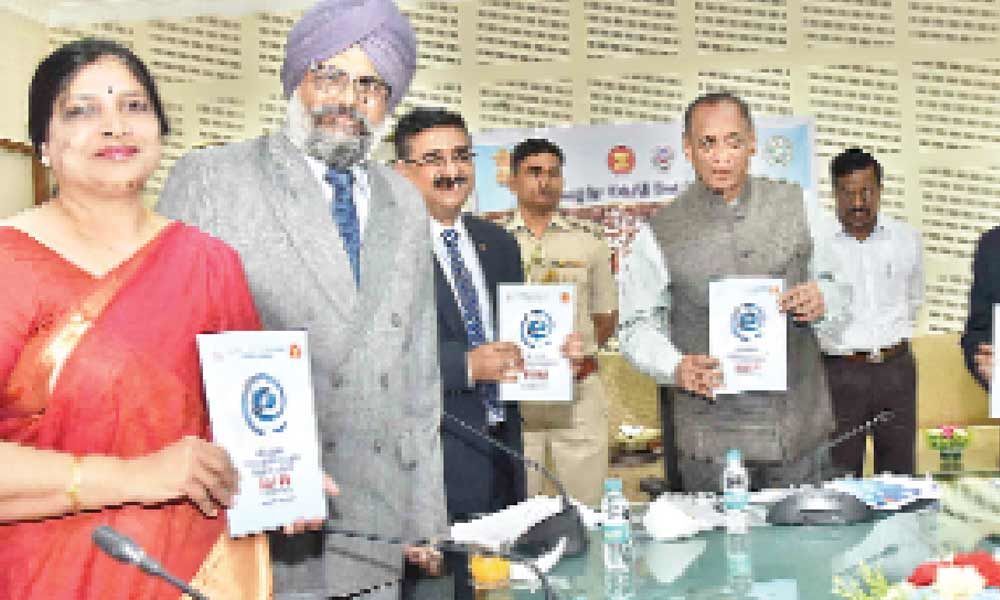'e-payments will be 15% of GDP in 4 yrs'
 Guv says while opening ASEAN civil servants training programme
Guv says while opening ASEAN civil servants training programmeEnhanced internet connectivity and high rate of penetration of smart phones have given a big boost to use of e-payments and e-commerce, thereby paving way for multiple beneficial outcomes, observes ESL Narasimhan India’s worth-emulating success stories in addressing the challenge of educating millions of its citizens on the use of technology-enabled financial solutions would be of great interest to the ASEAN Civil Servants--- B P Acharya, DG, Dr MCR HRD Institute
Jubilee Hills: Governor E S L Narasimhan on Monday inaugurated the training programme on 'e-Payments, Financial Inclusion, and Social Security' for Civil Servants from ASEAN countries, namely, Indonesia, Cambodia, Myanmar, Thailand, and Malaysiaon at Raj Bhavan.
The first-ever training programme for global audience, being conducted by Dr MCR HRD Institute, has been sponsored by ASEAN Secretariat, Jakarta.
Addressing the gathering, Governor E S L Narasimhan said that enhanced internet connectivity and high rate of penetration of smart phones gave a big boost to the use of e-payments and e-commerce, which brought in their wake multiple beneficial outcomes.
"India's digital payment system will be worth around $500 billion by 2020, thereby contributing to a whopping 15 per cent of India's gross domestic product in four years' time," stated the Governor.
Narasimhan also stated that the surging tide of digitisation and electronic payments would result in sustainable growth only when their focus was on ameliorating the lot ofthe most vulnerable and disadvantaged sections of the society.
"Empowering the weaker sections in terms of their education, health, and economic profile, will make them more productive, increase their purchasing power, and ultimately result in higher Gross Domestic Product," he stated and added that electronic and digital payments, financial inclusion, and social security were three important pillars which would be triangularly connected to make economies of all developing countries strong and stable across the globe.
The Governor said with a sense of pride that both Central and State governments have introduced many innovative social security programmes including banking outlets across the length and breadth of the country, scholarships for students, public distribution system, national rural employment guarantee scheme, a huge network of PHCs, welfare of women and child,pension schemes for poor, etc.
"All these initiatives will be greatly instrumental not only in enhancing the GDP but also increasing the gross happiness quotient of people."
The Governor opined that the attention of policy makers across the globe has been on the urban areas.
He, therefore, underlined the need for a greater focus on poor people residing in rural areas, understanding their unique problems, and finding out the impact of different schemes of government in bringing about a qualitative change in their lives.
"Statistics as a field of study should undergo a total transformation in order to become pro-poor in terms of its focus", he emphasised.
Governor Narasimhan underlined the need for increasing financial literacy on the part of people belonging to weaker sections of society relating to savings, investments, and availing credit from the banksin order to protect them from unscrupulous money lenderswho charge notoriously high interest rates.
B P Acharya, Ex Officio Special Chief Secretary & DG, Dr MCR HRD Institute, said that poor levels of awareness of financial products and services are often the reasons for financial exclusion.
"India's worth-emulating success stories in addressing the challenge of educating millions of its citizens on the use of technology-enabled financial solutions would be of great interest to the ASEAN Civil Servants", he said and added that the training programme, inter alia, will provide a vibrant platform not only in exchanging ideas and experiences on e-Payments, Financial Inclusion, and Social Security but also in identifying global best practices in these domains.








